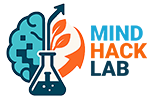Biohacked

The Mind-Body Revolution
How Biohacking is Transforming Mental Wellness
Your brain is running outdated software. What if you could upgrade it in just 30 minutes?
The problem isn't that you're weak. It's that your Stress and Rest pillars cracked at the same time. Here's the 30-minute fix—and how to rebuild over the next 30 days.
Sarah stared at her smartwatch as it buzzed with another stress alert. Third one today, and it wasn't even noon. As a software engineer juggling deadlines and a toddler at home, she'd tried everything – meditation apps, exercise routines, even expensive supplements. Nothing stuck. Then a colleague mentioned something that sounded almost too good to be true: biohacking her mental health in just 30 minutes.
Recent data shows 66% of professionals report burnout symptoms while 87% say learning new skills brings purpose back to work.
The $63 Billion Question: What Would YOU Biohack?
The biohacking market is exploding, projected to reach $63 billion by 2028. But here's what's fascinating: while everyone's talking about cold plunges and nootropics, the real revolution is happening in your mind – and it's more accessible than you think.
Most people think biohacking means expensive gadgets or extreme diets. The truth is, the most powerful mental upgrades happen when you target the right systems in your brain.
"Your brain is more software than hardware – perfectly capable of forming new neural pathways and making fresh connections." - Neuroplasticity Research
So what would you biohack if you could upgrade any aspect of your mental wellness in 30 minutes?
What Can Be Biohacked
1. Your Stress Response System
Imagine reprogramming your body's alarm system. The Boundary Script: Yes-With-Tradeoff technique helps you set limits without burning bridges. No more hair-trigger stress responses to every Slack notification.
2. Your Motivation Engine
What if procrastination wasn't a character flaw but a software bug? The 2-Minute Reframe technique creates immediate shifts in how you approach tasks that feel overwhelming.
3. Your Anxiety Patterns
The Worry Window technique contains anxious thoughts to scheduled times, while Center-Breath + Label provides immediate calm. Studies show these practical approaches work effectively even in brief formats.
4. Your Sleep System
The Middle-of-the-Night Protocol helps you fall back asleep without spiraling, while Micro-Recovery techniques reset your nervous system throughout the day.
5. Your Meeting Confidence
The If-Then Meeting Plan prepares you for high-stakes conversations. Often taught effectively through single sessions, these tools help you show up as your best professional self.
Real-World Transformations with Rapid Intervention
The Overwhelmed Parent
Jessica, mom of twin toddlers and part-time consultant, hadn't slept through the night in two years. Her patience was shot, her marriage was strained, and she'd started hiding in the bathroom just to breathe. After one session using the Micro-Recovery technique, she mapped her energy drains (surprise: saying yes to every playdate) versus what actually recharged her (15 minutes of morning coffee alone). Same chaos, different response. She still has toddlers. They're still insane. But she's not drowning anymore.
The Anxious Student
Tyler's law school applications were due in a month, but every time he opened his laptop, his brain went full static. Three Monster drinks and fourteen Wikipedia rabbit holes later, still nothing. Through the 2-Minute Reframe in a single session, he realized his brain wasn't broken - it was trying to protect him from potential rejection by never starting. Once he could name the pattern ("if I don't try, I can't fail"), he could interrupt it. Submitted all five applications. Got into three. Still procrastinates sometimes, but now he knows why.
The Burned-Out Professional
Software architect Priya was googling "how to become a yoga instructor" at 2 AM again. Ten years in tech, six-figure salary, and she fantasized about quitting daily. But it wasn't really about hating code - it was about hating the perpetual crunch, the meaningless features, the soul-crushing meetings about meetings. One session with the Boundary Script: Yes-With-Tradeoff helped her separate "this specific job is killing me" from "this entire career is wrong." She switched companies, not careers. Still codes. Actually enjoys it now. (Still does yoga, but as a hobby, not an escape plan.)
This is a skills practice, not medical or mental-health treatment. These techniques are designed to provide immediate relief and practical tools you can use right away.
The Science Behind Rapid Change
Here's what neuroscience tells us: Your brain is constantly predicting and adapting. Research on neuroplasticity shows the brain is more software than hardware. That is, it's perfectly capable of forming new neural pathways and making fresh connections based on various inputs.
Brief interventions work because they:
- Target specific neural pathways
- Provide immediate practical tools
- Create "aha" moments that stick
- Leverage your brain's natural plasticity
When applied to mental health through proven techniques like the Worry Window or Center-Breath + Label, biohacking becomes a powerful catalyst for change.
"But I'm Skeptical..."
"How can one session make a difference?"
Because you're not starting from zero. Your brain already has the hardware – you're just installing better software. Research shows the average person only attends ONE therapy session anyway. Why not make it count?
"Is this scientifically legitimate?"
Absolutely. These techniques are based on evidence-based approaches that have been adapted for brief, practical application. This is skills training designed for real-world results.
"What if I need more support?"
Brief interventions aren't about replacing all support – they're about giving you immediate tools while you explore other options. Think of it as mental first aid that actually lasts.
"Can this work alongside traditional therapy?"
Yes. Ask any therapist - they'll tell you the biggest challenge is what happens between sessions. These techniques give you tools to practice when your therapist isn't there. It's not either/or, it's both/and.
Your Personal Biohacking Blueprint
What will you biohack today?
- Stress responses that hijack your day
- Motivation patterns that keep you stuck
- Thought loops that drain your energy
- Resilience skills for life's challenges
- Acceptance strategies for what you can't change
The convergence of neuroscience, technology, and behavioral science has created an unprecedented opportunity. You don't need to become a biohacking extremist. You need targeted, evidence-based techniques that address your specific mental wellness goals.
Whether you're a struggling parent, a burned-out professional, or someone looking for better mental tools - the question isn't whether you can biohack your mind. It's which aspect you'll upgrade first.
Ready to Upgrade Your Mental Software?
Join thousands who've discovered the power of rapid mental transformation.
